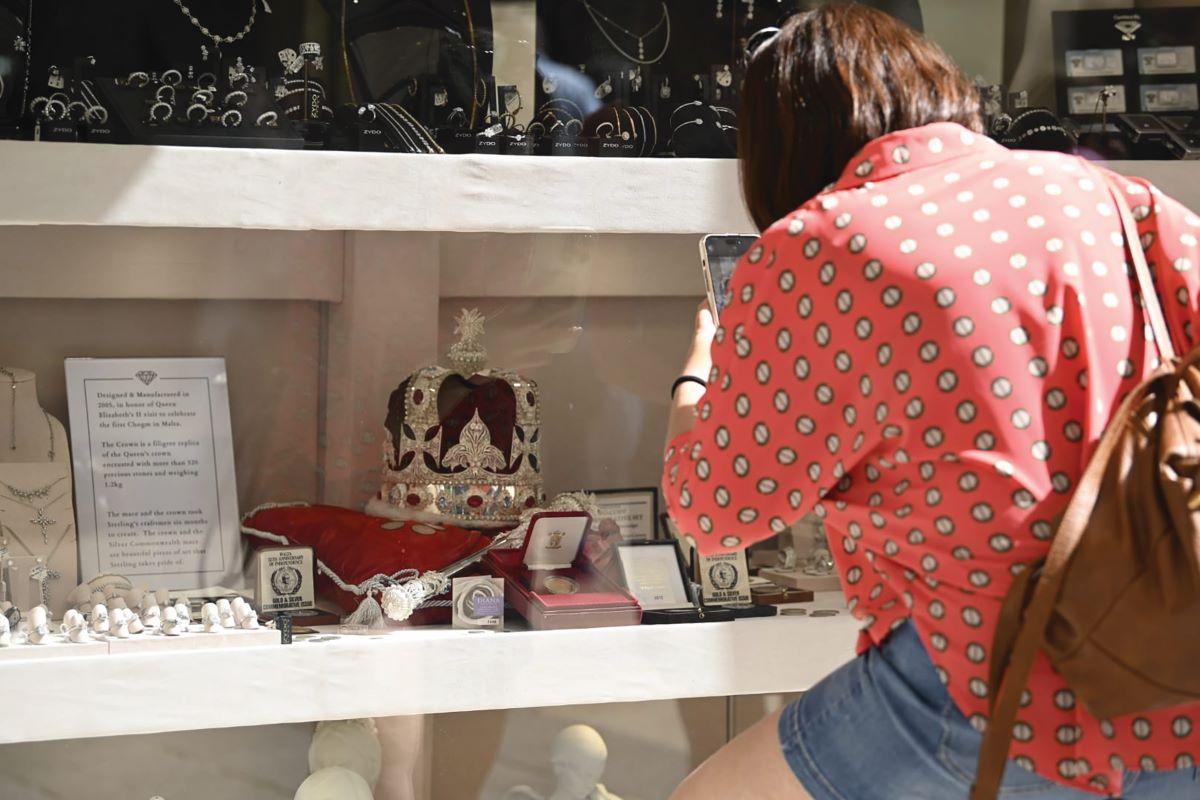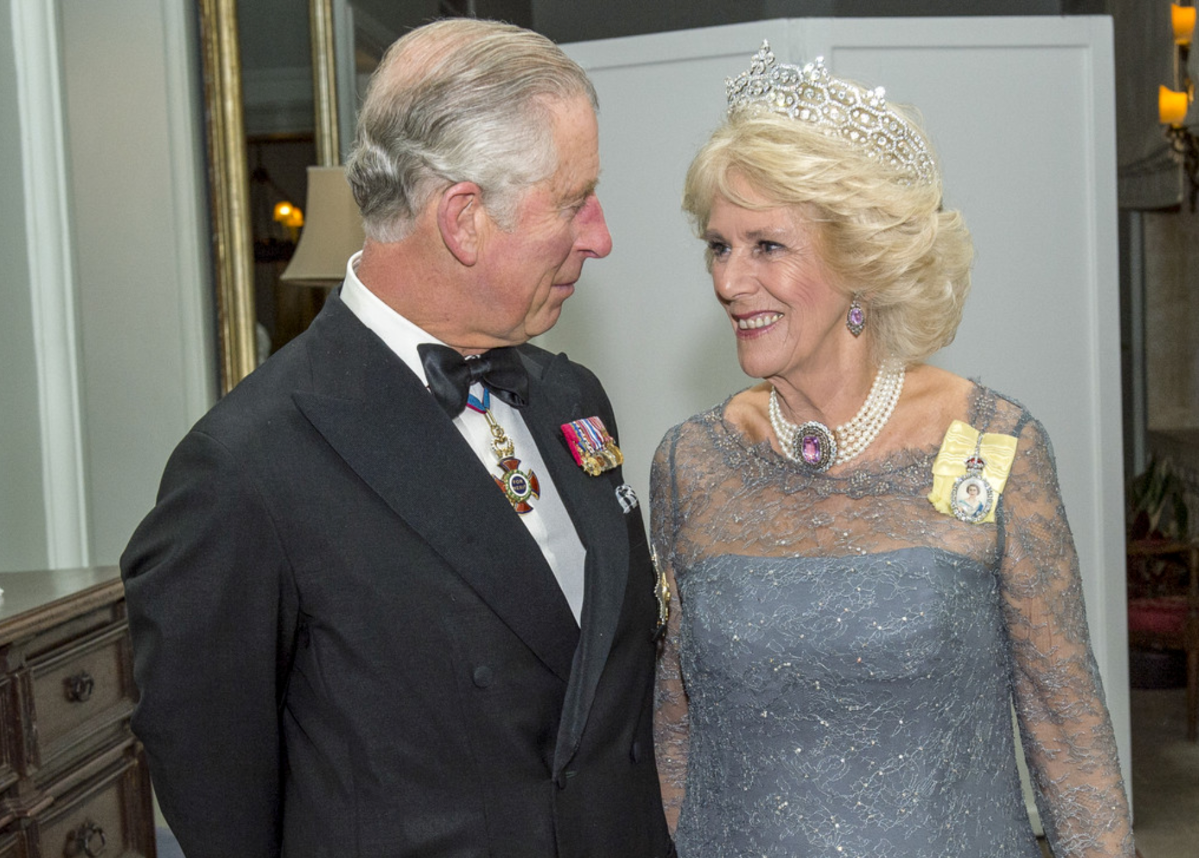Despite leaving the British empire and becoming a republic in 1974, it seems that the Maltese are still unsure of their stance towards the royal family as King Charles III’s coronation looms.
Times of Malta asked people if they plan to watch the Saturday event, their thoughts on the royal family and their role (or lack thereof) within modern society.
I’m a Republican. He is not my king.- John Dunford visiting from England
The festivities will begin at 11.20am tomorrow with a procession from Buckingham Palace to Westminster Abbey. Once there, King Charles will be crowned as the head of state and will begin his return trip to Buckingham Palace at 2pm, ending the day at 3.30pm as he waves at onlookers from a palace balcony.
When asked if their Saturday morning and early afternoon would be taken up watching King Charles, responses ranged from dramatic and defiant ‘no’s to fervent ‘yes’s.
 A photo of King Charles III is displayed on a tin of biscuits in a shop window in Windsor, ahead of the coronation ceremony. Photo: Adrian Dennis/AFP
A photo of King Charles III is displayed on a tin of biscuits in a shop window in Windsor, ahead of the coronation ceremony. Photo: Adrian Dennis/AFP“My grandma [will be watching] rather than me,” Jasmine Grech said with a chuckle.
Connie Fenech won’t be watching either, not because of her opinions on the monarchy but because a man will be wearing the crown instead of a woman. “I don’t like him much,” she added with a grin.
Whether they showed interest in watching the crowning or not, everyone asked was aware of the event in one way or another. Some chalked it up to yet another royal event while others instantly knew what will make this Saturday a special one.
Currently visiting Malta from England, John Dunford said the reason for his visit is to escape the coronation.
“I’m a Republican,” he said. “He is not my king.”
Of those who believe that the royal family is still relevant in today’s world, most were from an older generation who cited the historical and symbolic weight still carried by the monarchy.
“I guess a lot of people do look to them for that sort of guidance and that sense of patriotism when it comes to the UK,” Dave Sammut said.
“In a way, yes, it’s part of the culture and the history but, I mean, one thing that they should do is pay taxes,” Edgar Cancio said.
Replica of the royal crown
Meanwhile, in Valletta, Sterling Jewellers have a replica of the royal crown and sceptre on display, pieces that were made for the Queen’s visit to Malta in 2015 for the Commonwealth Heads of Government Meeting (CHOGM).
The ornate filigree pieces were made “piece by piece,” Sterling owner Alfred Fenech said.
“It took two people 40 days to make them,” he said.
The pieces will not be sold and will return to Fenech’s private collection after the coronation.
 in Valletta, Sterling Jewellers have a replica of the royal crown and scepter on display, pieces that were made for the Queen’s visit to Malta in 2015 for the Commonwealth Heads of Government Meeting (CHOGM).
in Valletta, Sterling Jewellers have a replica of the royal crown and scepter on display, pieces that were made for the Queen’s visit to Malta in 2015 for the Commonwealth Heads of Government Meeting (CHOGM).‘Outdated medieval phenomena’
Historian and author Charles Xuereb has always been outspoken on his anti-monarchy stance and his views on Britain’s celebration of its new royal leader are no different.
“All monarchies are outdated medieval traditional phenomena,” Xuereb said.
In some countries, he explained, monarchs have served as a symbol of unity for their nation, however, as their constitutional duties have waned over the years, so has their public presence.
Such “elaborated, fanatical and expensive ceremonies” defy the spirit of a parliamentary government, he said.
On the other hand, Joseph Galea Debono, Honorary President of the George Cross Island Association Malta, argued that the coronation is still very relevant today as the monarchy carries both local and international historical importance.
'Coronation has great relevance'
“It has great relevance because it commemorates an award by a monarch to honour Malta,” Galea Debono explained.
“Certainly, it seems, that for people within Britain, the coronation is still extremely relevant,” he said, especially by those who still believe in the monarchy.
Britain seems to agree with Xuereb’s views. According to a poll by YouGov which surveyed 3,070 British adults, 64 per cent of respondents said they had very little or no interest in the coronation, while only nine per cent said they cared “a great deal”.
 Prince Charles and his wife, Camilla, attending the CHOGM banquet in Malta, 2015. Photo: Facebook
Prince Charles and his wife, Camilla, attending the CHOGM banquet in Malta, 2015. Photo: FacebookPresented with the statistic, Galea Debono said many people, including the British, may not care as they worry about other issues such as health care and the rising cost of living.
“But millions around the world will be glued to their TV sets to watch the pomp and circumstance for which the British excel,” he said.
While Xuereb believes the occasion is still noteworthy as it marks the new head of the Commonwealth, of which Malta still forms part, he does not believe it calls for large celebrations.
“The Maltese Republic need not ‘celebrate’ the crowning of another country’s monarchical head of state. The Commonwealth is a club of former colonies headed by their former colonialist, with little relevance to world affairs,” Xuereb said.
Xuereb will be watching the coronation along with several other academics during a three-hour Campus FM talk show to discuss what Xuereb describes as a “fussy medieval British ceremony”.
“There is nothing wrong in watching the British Crown’s coronation,” he added. “It provides added free entertainment to Netflix’s The Crown.”
Royals' connection with Malta
King Charles and his family have always had a connection with the Mediterranean island, the late Queen Elizabeth having made Malta her home between 1949 and 1951 while she was still a princess.
Yet, King Charles’s first visit was in 1954 following a royal tour. While in the country, photos show the young prince going to Marsa to watch a Polo match and going on a seaside picnic.
The King’s most recent visit was in 2017 for the 75th anniversary of the awarding of the George Cross.
The two-day visit included a meeting with then-prime minister Joseph Muscat and a visit to St Paul’s Pro-Cathedral during its restoration, which the Prince supported through an undisclosed donation.
In an address, he said the George Cross remained as a symbol of what the Maltese people endured, as well as their strength and fortitude.